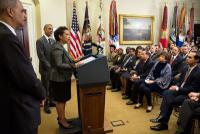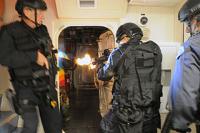-
34 Muslim states form new military alliance to fight terrorism
Saudi Arabia has announced the formation of a 34-state Islamic military coalition to combat terrorism, according to a statement published by SPA, the state news agency. A long list of Arab countries such as Egypt, Qatar, and the UAE, along with Turkey, Malaysia, Pakistan, and several African states were named in the Saudi statement. Iran is not part of the new alliance.
-
-
U.S. officials barred from reviewing social media postings of visa applicants
Officials from DHS and the Department of State, as a general policy, do not check social media postings of applicants out of civil liberties concerns. With this policy in place, the department’s officials who handled Tashfeen Malik’s application could not have seen her pro-ISIS postings and note her growing radicalization. Officials from United States Citizenship and Immigration Services (USCIS) and U.S. Immigration and Customs Enforcement (ICE) pressed for a change in DHS policy in light of the fact that social media is increasingly used by followers of jihadist groups to declare their allegiance, but the disclosures by Edward Snowden about NSA surveillance programs was behind the reluctance of DHS high officials to change the policy for fears such a change would further damage the administration’s standing with civil rights groups and European allies.
-
-
The third intifada; new, smaller Schengen; EU border patrol
Mahmud Abbas, the president of the Palestinian Authority, has been warned by the military wing of the PLO that unless he can persuade the UN Security Council to vote for a resolution calling for the creation of an independent Palestinian state, a new intifada will be launched to convince Israel that a continued occupation of Palestinian lands will be costly; European officials are planning to abandon the 30-year old Schengen Agreement and replace it with a much smaller, Western Europe-only free-travel zone; facing rising seas, residents of the Pacific island of Tuvalu are looking for a new home.
-
-
How French strategies prevented Al Qaeda's expansion in Mali
There have been many books on the U.S. wars in Iraq and Afghanistan, but there are few about the recent military interventions of America’s allies in countries such as Mali and others on the African continent. Because the January 2013 French intervention in Mali against the local Al Qaeda affiliate was quick, effective, and relatively low cost, the story contains valuable lessons for future strategy.
-
-
French backlash, Egypt: no terrorism in plane crash, Libyan unity government

The French right-wing Front National failed to translate its gains in the first round of France’s regional elections a week ago into any victories in the election’s second round on Sunday; Angela Merkel, facing growing opposition from within her party to her open-door refugee policy, said she would limit number of refugees arriving in German; Turkish prime minister Erdogan says the Middle East “would benefit greatly from normalization of Turkish-Israeli relations; the two rival Libyan governments are set to sigh a historic peace accord in Morocco on Wednesday.
-
-
Flawed U.S. Senate report on CIA torture doomed to "eternal controversy": Researcher

The U.S. Senate summary report on the allegations of CIA torture during the “war on terror” failed to live up to its original purpose, a Stanford scholar said. The researchers says that the U.S. Senate’s 2014 summary report on alleged CIA torture and interrogation Four key errors have doomed the Senate report to “eternal controversy,” she said: “It was not bipartisan, took too long to write, made little effort to generate public support along the way, and produced a declassified version that constituted a tiny portion of the full study.”
-
-
Terror attacks in Paris and California expose modern society’s lack of resilience
Our complex global society lacks resilience. The root cause of our vulnerability is the structure of the global economy: highly interconnected, complex, and filled with turbulence. Major disasters can occur unexpectedly, and even minor incidents can cascade into significant human and financial losses. Emerging pressures such as climate change and urbanization will only intensify the potential for extreme events and severe disruptions. Risk management makes sense in a stable environment with predictable events, but in today’s more complex risk landscape — the new normal — it is inadequate for dealing with fast-moving, unfamiliar threats that may cascade into disasters. The good news is that brittleness is not inevitable. It is a fundamental design flaw. Resilience — the capacity to survive, adapt, and flourish in the face of disruptive change — is a basic characteristic of all living systems, from individual creatures to entire ecosystems. In this age of turbulence, resilience has become a prerequisite for continued prosperity.
-
-
FBI unable to break 109 encrypted messages Texas terror attack suspect sent ahead of attack

FBI director James Comey told lawmakers this week that one of the suspects in the foiled terror attack in Garland, Texas, in May had exchanged 109 messages with sources in a “terrorist location” overseas ahead of the attack. U.S. intelligence and law enforcement agencies, however, have not been able to break into and read those messages because they were exchanged on devices equipped with end-to-end encryption software which, security services in the United States and Europe argue, make it impossible to monitor and track terrorists and criminals.
-
-
Assad’s future; Israel’s missile defense; U.S. overseas bases

Israel’s chief-of staff said that the likelihood of the Assad-Hezbollah-Iran axis winning the war in Syria is “zero” (his words). The Alawite community is too small to continue and provide soldiers to Syria’s army; both Iran and Hezbollah appear to have concluded that the cost of maintaining Assad in power is just too high; and Russia has decided against sending ground troops. Israel has successfully tested the Arrow-3, its anti-ballistic system designed to intercept long-range missiles. The Pentagon proposes creating an architecture of hub-and-spokes military bases overseas to fight terrorists.
-
-
WH finalizing executive order tightening background checks of gun buyers

Sources say that the White House is about to announce a new executive order to expand background checks of individuals wishing to purchase guns. One proposal being considered would designate more sellers as high-volume dealers, closing a legal loophole which allows many sales conducted online or at gun shows to escape existing background check provisions. Two other developments on the gun front: On Thursday, Connecticut governor Dan Malloy said he would sign an executive order which would bar people on the government’s terrorism watch lists from buying guns in Connecticut; in the House, Democrats demand that a 17-year ban on government-funded research into violence involving firearms be ended.
-
-
U.K. arrests record number of terrorism suspects, especially women, teenagers

According to the U.K. Home Office quarterly bulletin, 315 terror suspects – a record — have been arrested in the United Kingdom in the past year, with a sharp increases in arrests of women and teenagers. Therise in the number of terrorism-related suspects arrested is a reflection of the determined effort by the police and security services to address the ISIS threat and stem the flow of Britons to, and from, Syria.
-
-
U.K. university suspends Islamic society over hosting hate speakers

Queen Mary University of London has suspended the Islamic society at the university after the students’ union has launched an investigation into possible violations of protocols and procedures by the society. the society has been accused in the past of hosting events in which radical Islamist speakers, including speakers associated with Islamist fundamentalist groups. The U.K. government said that at least seventy events featuring hate speakers were held on U.K. campuses last year.
-
-
Loretta Lynch: No evidence San Bernardino shooters part of a cell

Some U.S. media reports said one of the San Bernardino shooters, Syed Rizwan Farook, may have been plotting an earlier attack in California with someone else, possibly as early as 2012. U.S. attorney general, Loretta Lynch, on a visit to London today (Wednesday), said, however, that there is no evidence yet that Farook and his wife had planned any other attacks or were part of a wider conspiracy.
-
-
Paris attacks expose weaknesses in Europe’s security structure

The 13 November attacks in Paris offered a painful demonstration of Europe’s security loopholes which the terrorists exploited to their advantage. The attacks should serve as a wake-up call to Europeans that the continental security structure, built in another era, is no longer sufficient and needs to be adapted to new circumstances. Whether or not such adaptations can be made, and made in time before the terrorists decide to launch another attack, is an open question.
-
-
Improving police responses to mass shootings

Before Columbine, law enforcement acted on the assumption that mass casualty incidents would involve a barricaded lone shooter who could be isolated, or a hostage situation in which the attackers would engage in negotiation before they killed more people. Thus, protocols established after the 1966 sniper attack at the University of Texas, called for first responders in the United States to set up a perimeter around the site of the shooting, gather as much information as possible, and then wait for specially trained assault teams, hostage negotiators, medics, and other specialists to arrive. “The assumption,” one expert said, “was that time was on their side.” Police forces arriving on the scene of a shooting no longer entertain this assumption.
-
More headlines
The long view
How Male Grievance Fuels Radicalization and Extremist Violence
Social extremism is evolving in reach and form. While traditional racial supremacy ideologies remain, contemporary movements are now often fueled by something more personal and emotionally resonant: male grievance.
